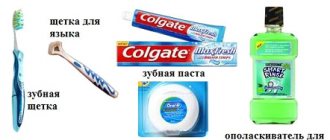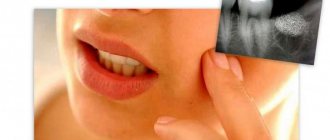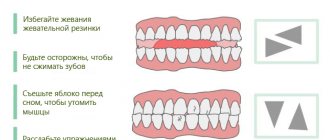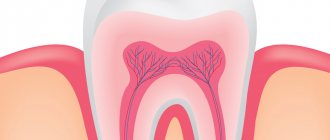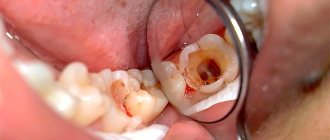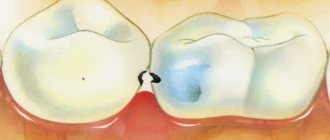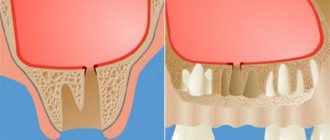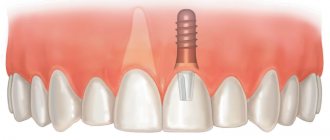Causes of tooth decay
All causes of tooth decay can be divided into two parts: internal and external. The external cause is bacteria that live in the oral cavity, which feed on carbohydrates and produce harmful acids. Everything is clear here - regular brushing and properly selected toothpaste solve this issue. But we already brush our teeth regularly, you say, but problems with caries are not decreasing... Someone will say that good or bad heredity determines the health of teeth. This is partly true, but genes determine more the shape and color of the enamel, and the mineralization of the tooth itself depends on nutrition.
Scientists say that teeth deteriorate because the body lacks the minerals calcium, phosphorus, magnesium and zinc. As a result of such a deficiency, these minerals are washed out of the teeth, which is the main reason for their deterioration.
There can be several reasons for a deficiency of microelements: poor diet, poor absorption and lack of vitamin D. If minerals are supplied in abundance, then dysbiosis can become an obstacle to their absorption. Disruption of the intestinal microflora, and its shift to more pathogenic forms, provokes inflammation and decay processes that inhibit the absorption of minerals. The main symptoms of this are diarrhea and regular bloating.
Read how to restore intestinal microflora here .
Deficiency of calcium and phosphorus leads to demineralization of bones. The first to suffer from calcium leaching are the jaw bones and the teeth themselves. The base of the tooth and the enamel itself are constantly renewed; if the building elements are insufficient, the tooth loses strength. This can lead to tooth decay from the inside out in the long term. The health of the gums for a beautiful smile is no less important; the cause of their bleeding is a simple deficiency of vitamin C.
Dysbacteriosis suppresses the immune system because 80% of all immune cells are located in the intestines. The immune system cannot cope with viruses and bacteria that live in the oral cavity. Their active reproduction can destroy enamel due to the production of aggressive acids. But even if we brush our teeth 5 times a day, this will not solve the internal problem.
The influence of microelements
Micronutrients that play a role in dental health include calcium, magnesium, phosphorus and fluoride. The balance and supply of sufficient amounts of calcium, phosphorus and fluorine will determine the level of absorption of these microelements. One without the other, these elements are not properly absorbed. Calcium is a “building material” for the construction of tooth tissue, mineralization of enamel, and a child up to three years of age needs 800 mg of it daily. Breastfed children receive the required dose of calcium daily with mother's milk, since milk calcium is well absorbed. Artificial babies receive calcium from infant formula and complementary milk products, which do not always meet the daily requirement.
Phosphorus is also involved in the construction of bones and teeth; about 80% of this mineral is found in bone tissue. Phosphorus absorption is impossible without the presence of calcium. Their optimal ratio is 1:6, and if this ratio is violated, the correct structure of the tooth tissue may be disrupted. In addition, magnesium is needed in the construction of tooth tissue, which gives teeth strength.
Vitamin D promotes the absorption of calcium and phosphorus in the intestines and their proper distribution in bone tissue. With a lack of calcium and phosphorus in the tooth enamel, destruction occurs, that is, the enamel is not able to properly mineralize. With a deficiency of these substances, the jaws themselves also begin to deform, and there is a significant delay in teething. Erupted teeth may have hypoplasia - this is a non-carious lesion of the teeth, characterized by underdevelopment of the tooth and partial absence of enamel. Under the enamel there is dentin, which has a tubular structure, and through these tubes acids, together with microorganisms, descend to the pulp chamber of the tooth, causing pulpitis. This happens in a short period of time, because... There is no natural barrier in their way - enamel. This sometimes happens with rickets.
Why do teeth deteriorate during pregnancy?
The mother's body needs an increased amount of minerals and vitamins for the full development of the baby. Often, women do not at all pay attention to such an important stage as preparing for pregnancy. For which, subsequently, they pay with their beauty, health and lost teeth. Because all the missing useful components for the development of the fetus will be removed from the mother’s body. Here is the main answer to the question why teeth deteriorate during pregnancy . But if you harmoniously diversify your diet before and during pregnancy, such problems will not arise.
Pregnancy is not the stage when you can enjoy eating harmful and empty foods; the price of such pleasure is too high. The category of these products is well known to everyone: fast food, sweets, chips, soda, trans fats, etc. They are absolutely empty in terms of vitamins and minerals, although proteins, fast carbohydrates, trans fats and flavor enhancers are present there in abundance.
A woman, instead of accumulating useful microelements, the need for which increases significantly, spends them on the contrary to neutralize the effects of harmful sugars. Calcium and magnesium are actively used to increase blood pH, which glucose lowers. If there is not enough calcium, magnesium and vitamin D in the diet, then minerals are washed out of tooth enamel. This is what causes tooth decay in pregnant women.
Why do baby teeth deteriorate in children?
Healthy baby teeth are an indicator of the health of the baby’s entire body. And their premature destruction may indicate a lack of important minerals and provoke, in the future, malocclusion. Also, in the period from 3 to 5 years, the formation of molars occurs, which will become the main foundation for their health in adulthood.
The layer of enamel on the first teeth is two times thinner than on the molars, which is why baby teeth deteriorate faster. It is important to notice a violation of mineralization in time and make sure that all the necessary nutrients are present in the child’s diet. It is better to get them from mother's milk, and then with food. Synthetic vitamins are less desirable in this regard, since the consequences of taking them have not been fully studied.
How to help your child
The main question is, if a child has bad baby teeth, what should parents do? There are some ways to improve a bad situation. These include the following rules:
- reduce carbohydrate intake if possible;
- do not lick the pacifier or sugar it, especially before bedtime;
- From an early age, accustom your child to brushing his teeth;
- if artificial feeding, use only adaptive formulas after consulting a pediatrician;
- wipe teeth with a swab after feeding;
- Rinse your mouth after every meal as soon as your child is able to do so.
But there is also a main factor that will help cope with bad baby teeth. Of course, this is a visit to the pediatric dentist. The sooner the doctor diagnoses and treats carious teeth, the more likely it is that the baby will grow up healthy and strong. After all, the functioning of the entire child’s body depends on proper digestion. Since dangerous bacteria accumulate in carious cavities, complete tooth destruction cannot be prevented except with the help of an experienced dentist.
Why sweets are bad for teeth
Sweets are really bad for your teeth, and not only because they are a breeding ground for bad bacteria. Also, sugar acidifies the body, weakens the immune system and reduces the antibacterial properties of saliva. To restore the acid-base balance, you need calcium, magnesium and zinc, which are prioritized to restore pH. And the mineralization of teeth occurs according to a residual principle, which often causes problems with teeth.
12 signs of acidification in the body, and how to fix it... (read the full version of the article)
Sweets include not only refined sugar, but also all products made from premium flour. This flour does not contain bran and is a fast carbohydrate, that is, pure glucose. Our macro and microelements are spent on its neutralization. It is because of the love of sweets that the teeth of adults, children and pregnant women deteriorate.
TIRED OF UNPLEASANT SMELL FROM YOUR MOUTH? Stop masking the consequences, it’s time to eliminate the cause... (read the full version of the article)
Proper dental care is important
If you want to shine with a Hollywood smile, take note of the following recommendations:
- Brush your teeth twice a day for at least 2 minutes.
- Use a toothbrush made of natural bristles.
- Buy fluoride-containing pastes with the triclosan-copolymer formula. It has been proven that they reduce the risk of developing caries and have anti-plaque activity.
- Always use dental floss to clean between your teeth and a brush to clean your tongue.
- Use mouthwash after brushing your teeth. It fights microorganisms in hard-to-reach places and keeps your breath fresh.
And most importantly, see your dentist regularly. This is necessary for professional teeth cleaning and early detection of dental problems.
What to eat if your teeth start to deteriorate?
If teeth begin to deteriorate, it means that the body is weakened and is not receiving enough valuable components. Of course, a damaged tooth must be treated by a dentist. However, in order to preserve the rest of your healthy teeth, you need to completely reconsider your diet.
We have found out the reason why teeth deteriorate; all that remains is to find out what foods will give them strength and health. Everyone's favorite sweets should be replaced with fresh fruits, vegetables, berries, as well as all types of dried fruits. Since in addition to glucose, it contains many vitamins and minerals. Include cottage cheese and aged cheeses in your diet, preferably made from goat's milk . Goats are not fed hormones and antibiotics, and the biological composition of their milk is much more valuable than cow's milk. In addition, goat milk is hypoallergenic.
Black sesame, pumpkin seeds, flax seeds, as well as walnuts, pine nuts, almonds and hazelnuts are rich in valuable minerals. All types of wild-caught sea fish will fill the body with essential minerals, as well as valuable Omega-3 fats. Don't forget about greenery! There is just one caveat: phytic acid, contained in spinach, rhubarb, sorrel and other plants, blocks the absorption of calcium from dairy products. Therefore, they must be taken at different times. Coffee, black and green tea help wash calcium and magnesium out of bones. Therefore, it is better to replace them with herbal teas.
Drinking water is one of the main sources of supply of valuable minerals to the human body. It is advisable to choose a product with a high content of calcium and magnesium (in a ratio of 2 to 1). Its acid-base balance should not be lower than 7 pH, and the fluoride content should be within normal limits. If the water in your region has a high content of this element, toothpaste should be chosen without fluoride.
Be healthy!
Get up and go away
- Some people suffer with their teeth all their lives, while others don’t care...
— Teeth are formed in the mother’s womb. If the mother ate well during pregnancy and took vitamins, her teeth will be healthy. Often, a child genetically inherits from his parents a successful or unsuccessful jaw structure and position of teeth, which largely determine the predisposition to dental problems. However, the healthiest teeth can be destroyed if you eat poorly, do not follow good hygiene, and visit the dentist only when absolutely necessary. Only annual preventive examinations help identify problems at an early stage and solve them with little effort.
— Are there treatment standards in dentistry? A situation often arises when one dentist says one thing, and another says the exact opposite. Who to believe in such cases?
— Doctors often have different points of view when one of them does not have a complete picture of the condition of the tooth and oral cavity as a whole. Therefore, it is very important to find “your” dentist and be treated by him. A doctor who knows the patient’s problems well will always choose the optimal treatment for him.
Dentists have standards of treatment, but with their help it is impossible to solve all problems, since there are no people with standard teeth. In dentistry, more important are methodological recommendations (the algorithm for a doctor’s work in a given situation), which determine what additional studies need to be carried out in a given situation.
Article on the topic
It crunches, it smells, it clicks.
9 good reasons to visit the dentist - Many people are afraid to have their teeth treated in private clinics.
A recent case: a patient had 22 healthy teeth removed. It’s easier and cheaper to wait in line at the district clinic... - In government institutions, doctors are not as interested in a larger volume of work as in commercial ones, so they really won’t advise anything unnecessary. In a commercial clinic, much depends not so much on the doctor, but on the owner of the clinic, who determines the policy of the doctor’s work with patients. As for the qualifications of doctors, even there you can get access to both a top-class professional and an inexperienced specialist. In addition, many doctors combine work in commercial and budget clinics.
— By what signs can a patient who is sitting in the dentist’s chair understand that it is better for him to get up and leave?
— Before starting treatment, the doctor must conduct a full examination of the oral cavity and collect an anamnesis (do a detailed interview with the patient) - this is very rare in dentistry. Then he must talk in detail about the results of the inspection, describe the problem and suggest ways to solve it (as a rule, there are several of them). In this case, the final decision always remains with the patient, and this requires time to think. If you are persistently persuaded to start treatment immediately, this is a reason to be wary. In truly emergency situations, the patient himself understands that he urgently needs help.
Moonlight, bird droppings, wood. How did our ancestors treat their teeth? More details

